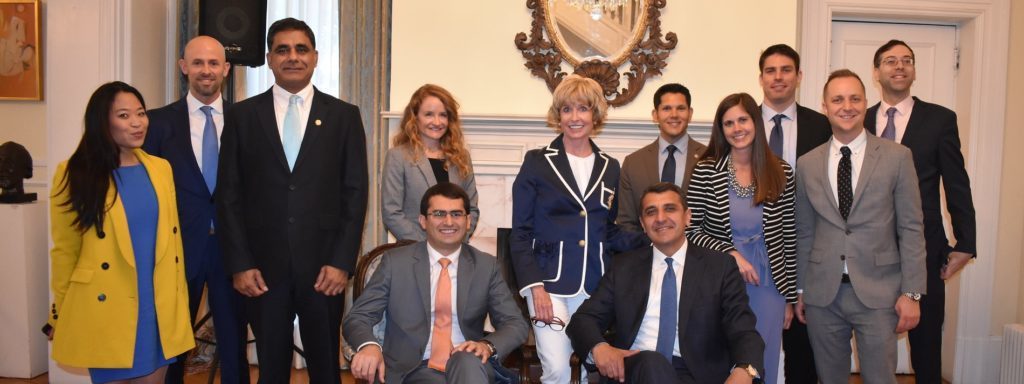
On Tuesday, June 4th, the Ambassador of Armenia, H.E. Varuzhan Nersesyan, and Coach Kathy Kemper, Founder and CEO of the Institute for Education co-hosted a discussion with the Honorable Hakob Arshakyan, Minister of Transport, Communication and Information Technologies of Armenia on the current developments in Armenian IT sector and the ecosystem of Armenia’s technological landscape.
A small landlocked country in the Southern Caucasus region, Armenia is considered one of the most rapidly growing IT destinations in the region. Following last year’s Velvet non-violent revolution, the country has undergone major democratic transformations, which make a more attractive economy for foreign markets. Armenia has been named “The Country of the Year” by the Economist. The breakfast took place at the Embassy.
The discussion began by the Ambassador congratulating Minister Arshakyan on his reappointment and briefly outlining the impacts of the Velvet Revolution on the country. Armenia recently underwent a critical transformation that ushered in a new era and a fresh new reality. The important feature of the revolution was that it was a homegrown revolution based on the people’s expression of will. The Minister has been an important part of this movement and the new era of technology. In the Soviet Union, Armenia was known as the Silicon Valley of the USSR and the new post-revolutionary Armenia will continue its focus on technology and a high-tech sector.
In the past, the majority of the Minister’s time has been focused on transportation and construction, with only a small amount of time focused on IT. After the revolution, Armenia has a new focus on the high-tech sector. They have separated the infrastructure that did not benefit technology and created a standalone high-tech industry. The Minister hopes to replicate the success stories of the US and after meeting with large corporations in Silicon Valley, he hopes to persuade them to come to Armenia. That being said, Armenia is very strong and successful in industry and education.
During the discussion, questions were raised about the process of setting up a business in Armenia, education and innovation, cybersecurity, and open data. The guests at the table learned that the system for setting up a new business in Armenia is all done online and is very easy. As explained by the Minister, it takes 10-15 minutes to register a company online and start the operation. Taxes are all online, and businesses can run on a digital signature, meaning there is no need to physically step into any offices. The information is centralized as well, and these offices do not ask for the same information when the information has already been provided to another location. Innovation is encouraged in the government, and the Armenian people are now happy to work for the government after the revolution. The Minister gave the example of his own backstory. Before becoming the Minister of Transport, Communication and Information Technologies, he was an entrepreneur and created a startup company with his friends. The company grew and now has an estimated value of $10 million. Similar to what the Presidential Innovation Fellows have done, he left the company to join the government, which is fairly common now.
As for innovation in education, the schools in Armenia work with students from an early age to build strategy and planning skills. This is done through learning chess! Throughout all of the schools in Armenia, students are being taught chess, which has led to many Armenians becoming chess champions in the past ten years. Although this is not directly connected to technology, these children can solve complex problems and develop high levels of skills when they grow up. In many of the schools in Armenia, there are also robotics labs where children can learn to program robots and build up practical skills in technology. Armenia is also home to four digital media learning centers, called TUMO centers, where children and teens can learn programming, AI, graphic design, and game design all at their own pace. An Armenian American founded TUMO, which has become a big success in Armenia and is being replicated in other countries as well.
On the topic of cybersecurity and open data, the Minister shared that Armenia is creating a Center of Excellence for cybersecurity and is investing $5 million to invest in this center. At their polytechnic university, they have a cybersecurity program in their engineering department. After Frank Reyes, a Congressional Innovation Fellow, asked the Minister about how they keep their data protected and secure, the Minister outlined how Armenian technology and culture work together to keep their data safe. Armenia was the first Christian country in the world and accepted Christianity as their state religion in the first century. If you look at Armenia compared to other countries in the area, it is very different from a cultural and business perspective. It is hard to visualize how a landlocked country such as Armenia can protect itself, but Armenia is bonded together by its culture, including its religion, and technology to protect itself and its data. They do not face any issues with centralizing their data and they try to protect it in every way that they can.
Overall, Armenia is in a good position technologically. They will continue to grow and expand its high-tech sector under the leadership of the Honorable Hakob Arshakyan, Minister of Transport, Communication and Information Technologies of Armenia. The discussion ended with the Ambassador thanking the guests, which included Presidential Innovation Fellows, Congressional Innovation Fellows, and Former Deputy U.S. Chief Technology Officer Cori Zarek.